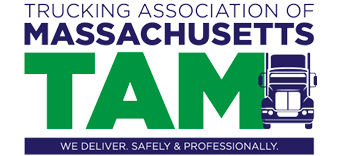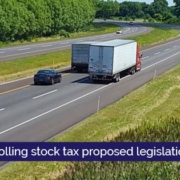TAM fact sheet on current rolling stock tax
Brief Summary
This legislation seeks to bring Massachusetts in line with a majority of other states within which an exemption from sales and use tax for rolling stock already exists. As drafted, the legislation amends Mass. Gen. Laws ch. 64H (i.e. sales tax) and Mass. Gen. Laws ch. 64I (i.e. use tax) to specifically exempt rolling stock from the sales and use tax. “Rolling stock” is defined as “vehicles such as trucks, tractors, and trailers that transport goods in interstate commerce.”
The legislation does not allow a motor carrier to avoid paying the multitude of fees otherwise required under federal, state and local law. Many other surrounding states (37) do not tax rolling stock; therefore, creating another incentive for interstate trucking companies to either leave Massachusetts or forego it in favor of other states. (i.e. potential companies in the future).
A recent study by Northeastern University’s Dukakis Center has shown that the elimination of the rolling stock tax will potentially produce an additional $15.9 million in additional taxes created by the growth of the for hire portion of the trucking industry. According to the same study, when factoring in private fleets as well, this benefit could double. This initiative will also incentivize trucking companies and companies with truck fleets to use newer, safer and more environmentally friendly trucks in the Commonwealth – whereas the current policy discourages this.
This legislation, which received a favorable report from the Joint Committee on Revenue last session, was included as part of the House Economic Development Bill during the same session.
Rationale
- The Trucking Association of Massachusetts (TAM), which represents the Commonwealth trucking industry, has seen the trucking industry in Massachusetts decline as many trucking companies move to other states. Part of the reason that trucking companies have left the Commonwealth is due to the Commonwealth’s tax policies.
- The Massachusetts Department of Revenue started collecting sales and use tax for rolling stock purchased in other states where those states have an exemption in place for rolling stock. The Commonwealth did not have a tax on rolling stock until 1996, but did not enforce the same until 2006.
- This legislation will create a more attractive environment for trucking companies to remain in the Commonwealth. Trucking companies rely on constantly maintaining and upgrading their equipment. This means purchasing new rolling stock on a regular basis. If they know that their out-of-state purchases will incur an instate tax, the companies will work to reduce their nexus to the taxing state (i.e. Massachusetts).
- By keeping trucking companies in the Commonwealth, the good jobs and competitive salaries that these companies offer will remain within the state. According to the United States Bureau of Labor Statistics, Massachusetts has the fifth highest annual mean wage for heavy and tractor-trailer drivers within the country. If more trucking companies find Massachusetts tax policy less favorable than neighboring states, the loss of Massachusetts trucking companies will become even more significant.
- If the Commonwealth discourages trucking companies from domiciling in the state, transportation expenses will rise — further impacting the high cost of living already experienced in the Commonwealth. The costs associated with transporting goods are fairly straightforward. If the Commonwealth’s tax policies cause trucking companies to domicile elsewhere, the additional fuel, tolls and vehicle maintenance, among other costs, will be borne by Massachusetts residents and businesses.
- This legislation is a matter of common sense. If a company does not purchase a product within State (A), it is not fair for State (A) to tax the company for purchasing a product in State (B). The purpose of taxes and fees is to support the mechanisms that help the taxpayer. (i.e. road and bridges, police, fire, etc.). In the case of the trucking industry, gas taxes, tolls, vehicle registrations and other license fees and taxes cover the expense of the trucking industry. Collecting sales and use tax on rolling stock purchased in other jurisdictions creates a disincentive for companies to expand in the Commonwealth. Given that states such as New Hampshire, which exempts rolling stock from sales and use tax, Massachusetts’ current tax policy will simply lead to higher costs for Massachusetts residents and businesses while driving economic opportunity to neighboring states. Various truck companies, who may be domiciled in Massachusetts or have repair facilities in Massachusetts, are now seeking to locate them outside of the state to reduce the substantial nexus necessary to collect such tax.
- This legislation will create a more attractive environment for trucking companies to remain in the Commonwealth. By keeping trucking companies in the Commonwealth, the Commonwealth will keep the good jobs and salaries these companies offer within the state. Historically, states have exempted rolling stock from sales and use tax. If the Commonwealth discourages trucking companies from domiciling in the state, transportation expenses will rise further impacting the high cost of living already experienced in the Commonwealth.
- From a public safety and environmental perspective, this legislation will ensure that trucking companies and companies with truck fleets will run their newer trucks in the Commonwealth. If a company knows that it will have to potentially pay a tax on new rolling stock used in the state, the company will not allow the rolling stock to have any nexus or connection to the Commonwealth. This means that older, less safe and more environmentally unfriendly trucks remain in the Commonwealth.
- The Dukakis Center at Northeastern University was asked by the Trucking Association of Massachusetts to study the economic impact of the trucking in the Commonwealth. Key findings from the Dukakis Center study, released this Spring, included the following:
- “The overall trucking industry (including private and for-hire tucking) represent about one in 12 jobs or about 300,000 jobs in Massachusetts in 2017.”
- “Each local trucking employee on average generates $3,396 per year in state and local payroll, income and property taxes and each local truck on average generates $3,125 per year in taxes from support service activity.”
- “Most states—37 out of 50—exempt for-hire interstate trucking firms from paying sales tax on new equipment purchases to encourage interstate trade by local firms. States with full exemptions include four New England states—Connecticut, Maine, New Hampshire, and Rhode Island— and a fifth, Vermont, with the tax capped at $1,850 per truck. Massachusetts is the only New England state with no sales tax exemptions for interstate for-hire trucking firms.”
- “The following occupations illustrate how well these production jobs pay: 1) diesel engine mechanic (2017 US average income=$48,000 and MA=$57,550); 2) riggers (US=$50,270 and MA=$56,650); 3) machinist (US=$44,160 and MA=$51,020); and, 4) heavy and tractor-trailer truck drivers (US=$44,500 and MA=$50,580). Source: Bureau Labor Statistics (2017).”
- “There are several problems with Massachusetts’ application of sales and use taxes applied to trucks (aka, taxing rolling stock). First, doctrinal inconsistency: most states apportion and promote local trucking activity; Massachusetts does the opposite. Second, taxing rolling stock and increasing the relative tax burden motivates relocation (the impact of state and local taxes on location is well established). Third, the benefits of efficient trucking are broad, but the costs are disproportionately borne by local trucking companies (in a competitive industry passing along these costs to customers is impossible). Last, taxing local companies at a higher rate yields slower local company growth.”
- “Analysis of the number of for-hire trucking establishments in each state over time illustrates that states that apply sales tax on the purchase of trucks engaged in interstate carriage have significantly fewer firms. From this perspective, we presented a counterfactual consideration above: if Massachusetts for-hire trucking employment grew at the rate of the United States, 2,768 more employees and 2,076 more power units would be operating and generating an additional $15.9 million in tax revenue per year.”
- “Hence, we find that if Massachusetts’ for-hire trucking industry grew at the same rate as the overall United States rate, we would have 2,768 more employees and 2,076 more power units would be operating. In total, an additional $9.4 million in payroll, income and property taxes, and $6.5 million in taxes related to purchase of support and ancillary services: hence, an additional $15.9 million per year. As Massachusetts private fleets are also subject to the same sales and use taxes, we assume the impact will be similar; hence, total tax implication can twice as much when including supermarket, manufacturing and other private fleets.” (emphasis added).



